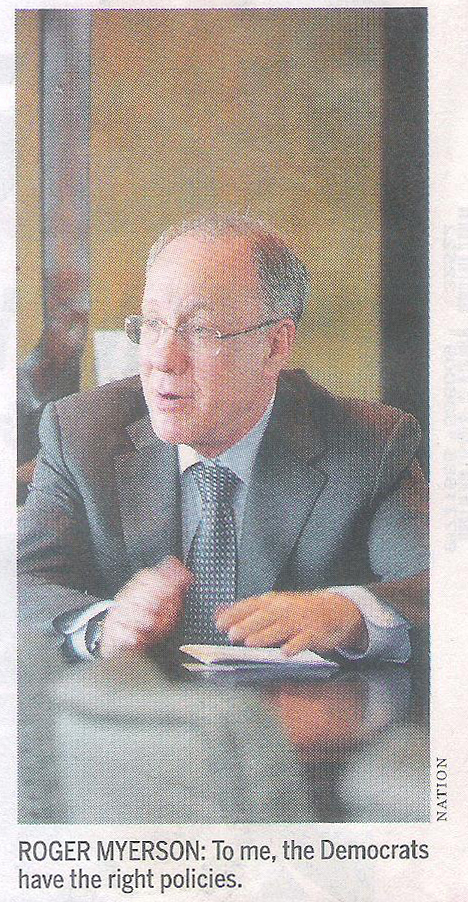|
| |
 |
|
Visiting Nobel eonomics laureate confident US will avoid 'Fiscal Cliff'
|
the Nation, 15 November 2012
Dr. Roger Myerson, the 2007 Nobel laureate in economics and a specialist in game theory, is optimistic that US President Barack Obama and his Republican opposition will reach a compromise on the "fiscal cliff".
Asked to explain what game theory can say about US politics after voters re-elected Obama as president and supported Republicans to retain control over the House of Representatives, Myerson said that the US constitution had designed the democratic system sometimes to have a split government, with one party holding the presidency and Senate and the other party the House.
"As an American I admire the kind of parliamentary system that you have in Thailand because I find a split government is frustrating sometimes. It makes the US government less effective," said Myerson, a professor at the University of Chicago.
However, he said he was optimistic that the Democrats, who control the Senate, and Republicans, who enjoy a minority in the House, will revise the confluence of tax hikes and spending cuts, called the fiscal cliff, before they take effect in January. Many economists are worried it would lead to an economic contraction in the Unites States next year.
All americans are hoping the parties will make some major decisions about how to reduce fiscal deficits, cut some spending and raise som taxes, he said.
Americans do not agree exactly on what the decision should b. While some would prefer some decisions, some would prefer others, but everyone agrees the US government has to make decisions and reduce the uncertainty of the fiscal future, he said.
He said he supported Obama's proposal and disagreed with the Republicans hard line of not increasing any taxes.
"To me, the Democrats have the right policies. I argued with some of my economist colleagues who are very strong supporters of the other party," he said.
Obama said recently that the solution to the US fiscal problem needed to be a balanced mix of some tax increases for some Americans and some spending cuts. Myerson believes Obama is quite sincere and prepared to negotiate with the Republicans.
"I hope he will negotiate actively with the Republicans on this… But it's almost a religious line that most Republicans in Congress sign notes they will never vote to raise taxes. I don't think that's an appropriate policy," he said.
As US economic contraction is not so much a matter if fiscal fixes as overall financial reform, he said.
"Iam a Chicago economist and I think it's more than just fiscal policy. Fiscal policy is not enough to drive our economy back into recession. I worry more about the implementation of fiscal reform."
The US needs to heal its financial system. The current problem came out of the banking system.
"It has been healing, but Dodd-Frank reforms are confusing and slow. But I am not so concerned that a reduction of deficits will be a problem,"he said.
It is not necessary to cut budget deficits right now. "The spending cuts have to come gradually and the tax increases should come gradually to give the economy more time to heal… We need to be making a decision and putting (forward) a better fiscal plan for the long term," he said.
Although the United States and China have been sparring over the yuan-dollar exchange rate with trade retaliation and protectionism, both sides have been benefited from trade, he noted.
"The US benefits from having trade with China, China has benefited from the trade with the US and the rest of the world. Both sides can argue about what the exchange rate should be. If the renminbi is undervalued relative to the US dollar, that means the Chinese people are sending real goods and services to the United States and getting nothing but paper in return. Who will benefit from that?" he said.
"America is the one that has complained but actually China is the loser."
If Bejing undervalues the currency, Americans do not lose more than the Chinese, because Chinese have to hold dollar bills. And the US has a printing press to print dollars.
"We can make as much money as you like. I don't think the US is going to have big inflation," he said.
The Chinese should not hold too many US Treasury bills but should spend their dollars on real goods and services from the US, he said.
Turning to Thailand, Myerson said the controversial auction of bandwidth for third-generation cellular services might not have produced the desired results for consumers. Cheap licenses may not lead to low service prices because of the limited number of operators, which may not encourage competition for best services.
Myerson is visiting Bangkok to give a public lecture at the fourth event in an Asean series on "Bridges - Dialogues Towards a Culture of Peace" facilitated by the International Peace Foundation.

|
|
|
